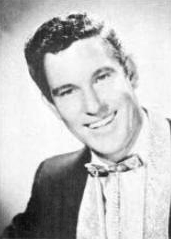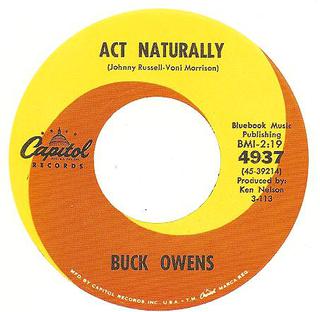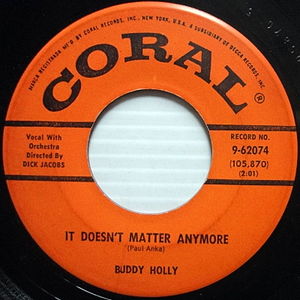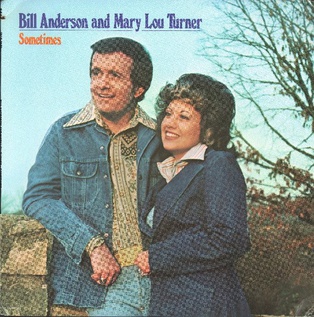
Frederick Segrest, known professionally as Freddie Hart, was an American country musician and songwriter best known for his chart-topping country song and lone pop hit "Easy Loving," which won the Country Music Association Song of the Year award in 1971 and 1972.
"Blue Moon" is a popular song written by Richard Rodgers and Lorenz Hart in 1934 that has become a standard ballad. Early recordings included those by Connee Boswell and by Al Bowlly in 1935. The song was a hit twice in 1949, with successful recordings in the U.S. by Billy Eckstine and Mel Tormé.
This is a list of notable events in country music that took place in the year 1971.

"That Old Black Magic" is a 1942 popular song written by Harold Arlen (music), with the lyrics by Johnny Mercer. They wrote it for the 1942 film Star Spangled Rhythm, when it was sung by Johnny Johnston and danced by Vera Zorina. The song was nominated for the Academy Award for Best Original Song in 1943 but lost out to "You'll Never Know".

"Act Naturally" is a song written by Johnny Russell, with a writing credit given to Voni Morrison and publishing rights transferred to Buck Owens. It was originally recorded by Buck Owens and the Buckaroos, whose version reached number one on the Billboard Country Singles chart in 1963, his first chart-topper. In 2002, Shelly Fabian of About.com ranked the song number 169 on her list of the Top 500 Country Music Songs.

"Are You Lonesome Tonight?" is a song written by Roy Turk and Lou Handman in 1926. It was recorded several times in 1927—first by Charles Hart, with successful versions by Vaughn De Leath, Henry Burr, and the duet of Jerry Macy and John Ryan. In 1950 the Blue Barron Orchestra version reached the top twenty on the Billboard's Pop Singles chart.

"It's Only Make Believe" is a song written by drummer Jack Nance and Mississippi-born singer Conway Twitty, while both were touring across Ontario, Canada in 1958. The song was recorded on May 7 for MGM Records; produced by Jim Vienneau, it featured Floyd “Lightnin’” Chance on double bass. It was released on side B of "I'll Try" on July 14, 1958. Known as Harold Lloyd Jenkins until changing his name in 1957, Twitty was a relatively unknown rock n' roll singer at the time. That all changed when side B finally hit the chart in September, then made No. 1 twice, on November 10 and 24. The single topped both U.S. and the UK Singles Chart, and became the only No. 1 pop single of his career. Years later, on a segment of 'Pop Goes The Country', Twitty stated it was a hit in 22 countries, and sold over 8 million copies. He did not become a country music star until he crossed over in 1966.

"Let It Be Me" is a popular song originally published in French in 1955 as "Je t'appartiens" interpreted by Gilbert Bécaud. It became popular worldwide with an English version by the Everly Brothers and later with the duet by Betty Everett and Jerry Butler.
"I Forgot More Than You'll Ever Know" is a song, written by Cecil Null.
"That Lucky Old Sun " is a 1949 popular song with music by Beasley Smith and words by Haven Gillespie.

Keith Douglas Washington is an American R&B vocalist from Detroit who recorded the hit single "Kissing You" in 1991. The song was also used as background music for the ABC television soap opera General Hospital. "Kissing You" was nominated for a Grammy Award for Best R&B Vocal Performance Male and won a 1992 Soul Train Music Award for Best R&B/Soul Single – Male. The song also topped the Billboard Hot R&B/Hip-Hop Songs chart for one week..

"It Doesn't Matter Anymore" is a pop ballad written by Paul Anka and recorded by Buddy Holly in 1958. The song was issued in January 1959, less than a month before Holly's death. "It Doesn't Matter Anymore" reached number 13 as a posthumous hit on the Billboard Hot 100 chart in early 1959, shortly after Holly was killed in a plane crash on February 3, 1959. The single was a two-sided hit, backed with "Raining in My Heart". "It Doesn't Matter Anymore" was Holly's last US Top 20 hit and featured the orchestral backing of Dick Jacobs. It was also successful in the United Kingdom, where it became the country's first posthumous number 1 hit.

Young Love is a collaborative studio album by American country artists Connie Smith and Nat Stuckey. It was released in July 1969 via RCA Victor and contained 12 tracks. The project was a collection of duets between Smith and Stuckey. The duets were mostly cover versions of songs previously recorded by other country artists. Many of these songs had originally been released as duets themselves. Included on the project was the pair's cover of "Young Love", which became a top 20 single on the American country songs chart. In 1969, Billboard gave the album a favorable response.

I Never Knew is the twenty-third solo studio album by American country singer Connie Smith. It was released in August 1974 on Columbia Records and contained 11 tracks. The album was a mix of original material and covers of songs by other artists. The project was described as a set of traditional songs. Its title track was a single that reached the top 20 of the American country songs chart. The album itself charted the American country LP's chart following its release. The project was met with a favorable review from Billboard magazine.
"Please Help Me, I'm Falling" is a 1960 song written by Don Robertson and Hal Blair and first recorded by Hank Locklin. The single was Locklin's most successful recording and was his second number one on the country charts. "Please Help Me, I'm Falling" spent fourteen weeks at the top spot and spent nine months on the country chart and crossed over to the Hot 100 peaking at number eight.
"I Love You Because" is a song written and recorded by country music singer and songwriter Leon Payne in 1949. The song has been covered by several artists throughout the years, including hit cover versions by Al Martino in 1963 and Jim Reeves in 1964.
"Make Love to Me" is a 1954 popular song with words and music written by a larger team than normally is known to collaborate on a song: Bill Norvas, Alan Copeland, and the New Orleans Rhythm Kings, comprising Leon Rappolo, Paul Mares, Ben Pollack, George Brunies, Mel Stitzel, and Walter Melrose. The melody was derived from a 1923 song, "Tin Roof Blues", composed by the New Orleans Rhythm Kings.

"So Sad " is a song written by Don Everly, which was released by The Everly Brothers in 1960. The song was later a country hit for multiple artists in the 1970s and 80s.

Sometimes is a studio album by American country music artists Bill Anderson and Mary Lou Turner. It was released in January 1976 on MCA Records and was produced by Owen Bradley. It was Anderson's twenty fourth studio recording and Turner's first. The album's title track became a major hit on the country charts in both the United States and Canada. The album also reached major positions on the country chart in the United States. Sometimes was the first collaborative project between Anderson and Turner. Anderson hired Turner to work as his duet partner during this period and the project was one of two recordings they made.










